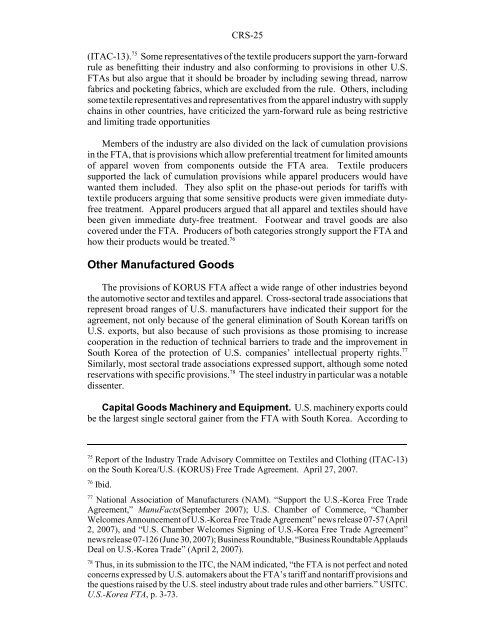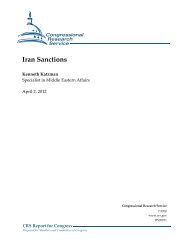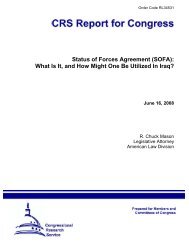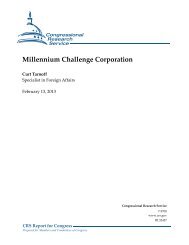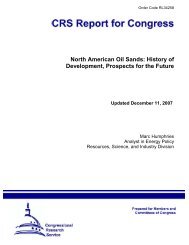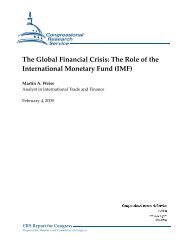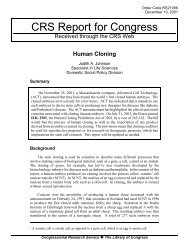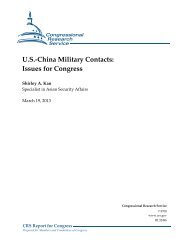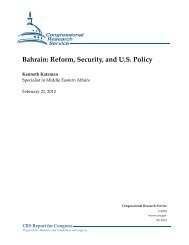The Proposed U.S.-South Korea Free Trade Agreement (KORUS ...
The Proposed U.S.-South Korea Free Trade Agreement (KORUS ...
The Proposed U.S.-South Korea Free Trade Agreement (KORUS ...
- TAGS
- korea
- fpc.state.gov
You also want an ePaper? Increase the reach of your titles
YUMPU automatically turns print PDFs into web optimized ePapers that Google loves.
CRS-25<br />
(ITAC-13). 75 Some representatives of the textile producers support the yarn-forward<br />
rule as benefitting their industry and also conforming to provisions in other U.S.<br />
FTAs but also argue that it should be broader by including sewing thread, narrow<br />
fabrics and pocketing fabrics, which are excluded from the rule. Others, including<br />
some textile representatives and representatives from the apparel industry with supply<br />
chains in other countries, have criticized the yarn-forward rule as being restrictive<br />
and limiting trade opportunities<br />
Members of the industry are also divided on the lack of cumulation provisions<br />
in the FTA, that is provisions which allow preferential treatment for limited amounts<br />
of apparel woven from components outside the FTA area. Textile producers<br />
supported the lack of cumulation provisions while apparel producers would have<br />
wanted them included. <strong>The</strong>y also split on the phase-out periods for tariffs with<br />
textile producers arguing that some sensitive products were given immediate dutyfree<br />
treatment. Apparel producers argued that all apparel and textiles should have<br />
been given immediate duty-free treatment. Footwear and travel goods are also<br />
covered under the FTA. Producers of both categories strongly support the FTA and<br />
how their products would be treated. 76<br />
Other Manufactured Goods<br />
<strong>The</strong> provisions of <strong>KORUS</strong> FTA affect a wide range of other industries beyond<br />
the automotive sector and textiles and apparel. Cross-sectoral trade associations that<br />
represent broad ranges of U.S. manufacturers have indicated their support for the<br />
agreement, not only because of the general elimination of <strong>South</strong> <strong>Korea</strong>n tariffs on<br />
U.S. exports, but also because of such provisions as those promising to increase<br />
cooperation in the reduction of technical barriers to trade and the improvement in<br />
<strong>South</strong> <strong>Korea</strong> of the protection of U.S. companies’ intellectual property rights. 77<br />
Similarly, most sectoral trade associations expressed support, although some noted<br />
reservations with specific provisions. 78 <strong>The</strong> steel industry in particular was a notable<br />
dissenter.<br />
Capital Goods Machinery and Equipment. U.S. machinery exports could<br />
be the largest single sectoral gainer from the FTA with <strong>South</strong> <strong>Korea</strong>. According to<br />
75 Report of the Industry <strong>Trade</strong> Advisory Committee on Textiles and Clothing (ITAC-13)<br />
on the <strong>South</strong> <strong>Korea</strong>/U.S. (<strong>KORUS</strong>) <strong>Free</strong> <strong>Trade</strong> <strong>Agreement</strong>. April 27, 2007.<br />
76 Ibid.<br />
77 National Association of Manufacturers (NAM). “Support the U.S.-<strong>Korea</strong> <strong>Free</strong> <strong>Trade</strong><br />
<strong>Agreement</strong>,” ManuFacts(September 2007); U.S. Chamber of Commerce, “Chamber<br />
Welcomes Announcement of U.S.-<strong>Korea</strong> <strong>Free</strong> <strong>Trade</strong> <strong>Agreement</strong>” news release 07-57 (April<br />
2, 2007), and “U.S. Chamber Welcomes Signing of U.S.-<strong>Korea</strong> <strong>Free</strong> <strong>Trade</strong> <strong>Agreement</strong>”<br />
news release 07-126 (June 30, 2007); Business Roundtable, “Business Roundtable Applauds<br />
Deal on U.S.-<strong>Korea</strong> <strong>Trade</strong>” (April 2, 2007).<br />
78 Thus, in its submission to the ITC, the NAM indicated, “the FTA is not perfect and noted<br />
concerns expressed by U.S. automakers about the FTA’s tariff and nontariff provisions and<br />
the questions raised by the U.S. steel industry about trade rules and other barriers.” USITC.<br />
U.S.-<strong>Korea</strong> FTA, p. 3-73.


